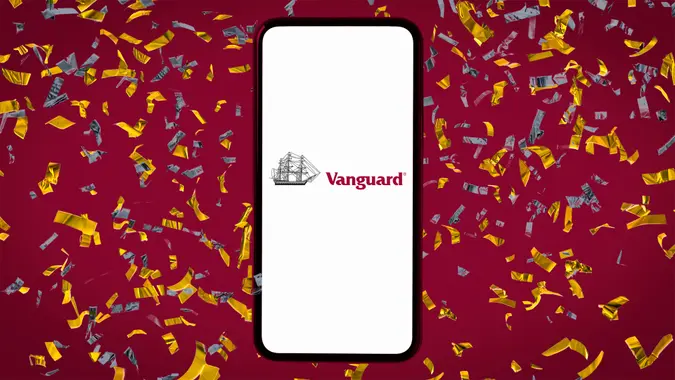9 Best 5-Year CD Rates Today: February 2026 — Earn Up to 4.09% APY

Commitment to Our Readers
GOBankingRates' editorial team is committed to bringing you unbiased reviews and information. We use data-driven methodologies to evaluate financial products and services - our reviews and ratings are not influenced by advertisers. You can read more about our editorial guidelines and our products and services review methodology.

20 Years
Helping You Live Richer

Reviewed
by Experts

Trusted by
Millions of Readers
If the appeal of a locked-in return is appealing, a five-year certificate of deposit, or CD, might be a good fit for your cash. A five-year CD may be worthwhile for long-term financial goals. As of Feb. 6, 2026, the top 5-year CD rates are reach up to 4.09% APY, depending on the bank and minimum deposit.
Keep reading to learn about the best five-year CD rates:
Today’s Best 5-Year CD Rates
Here’s a look at nine banks or credit unions offering the best five-year CD rates in February 2026.
| Financial Institution | Annual Percentage Yield | Minimum Opening Deposit |
|---|---|---|
| Mountain America Credit Union | Up to | $5 to $500 |
| Sallie Mae Bank | $2,500 | |
| Marcus by Goldman Sachs | $500 | |
| GTE Financial | $500 | |
| Synchrony Bank | $0 | |
| Bread Savings | $1,500 | |
| Alliant Credit Union | to | $1,000 |
| Lafayette Federal Credit Union | $500 | |
| Randolph-Brooks Federal Credit Union | to | $1,000 |
Mountain America Credit Union
- APY: Up to
- Minimum opening balance: $5 to $500
- Early withdrawal penalty: 365 days of dividends
Mountain America Credit Union offers a standard, growth or youth certificate in a variety of term lengths, including the 5-year certificate and its solid APY. Bump options are available on the standard certificate. though you must open the account with at least $500. The growth certificate offers a higher APY and only $5 to open, but no bump option.
Pros
- Bump up your rate with a standard certificaate
- $5 to open a growth certificate
Cons
- Penalty of 365 days of dividends if you withdraw the certificate before it matures
Sallie Mae Bank
- APY:
- Minimum opening balance: $2,500
- Early withdrawal penalty: 180 days’ worth of simple interest
Sallie Mae pays APY on a 5-year CD, which is significantly higher than the national average CD rate for a 5-year term. It offers an automatic renewal option at the end of your term, but charges 180 days’ worth of simple interest if you withdraw the funds early.
Pros
- High interest rate
- Lenient early withdrawal penalty
- No membership requirements
Cons
- High minimum opening deposit
- No physical locations
Marcus by Goldman Sachs
- APY:
- Account minimum: $500
- Early withdrawal penalty: 180 days of interest
Marcus by Goldman Sachs has a APY available on a 5-year CD. You can open a CD with at least $500 online. If you withdraw your funds early, the early withdrawal penalty is lenient for a 5-year term.
Pros
- No membership requirements
- High interest rate
- Relatively low minimum opening deposit
- Lenient early withdrawal penalty
Cons
- No physical locations
GTE Financial
- APY:
- Minimum opening balance: $500
- Early withdrawal penalty: 90 to 365 days of dividends. You may not withdraw in the first 60 days.
GTE Financial is a credit union serving the the Tampa Bay community. Membership is uncomplicated — you can join through a family member, your employer, your location or by joining the CU Savers club. Once a member, you can open various accounts, from checking to savings, and the certificates with favorable rates well above the national average.
Pros
- Low minimum balance required
- One of the highest available APYs for a 5-year CD
- Standard and jumbo CDs are offered
Cons
- Credit union membership required
Synchrony Bank
- APY:
- Minimum opening balance: None
- Early withdrawal penalty: 365 days of interest
Synchrony Bank is an online bank, and it pays a high interest rate on its 5-year CD. It has no minimum opening deposit required, which makes it a lenient option that savers can take advantage of.
Pros
- High interest rate
- No minimum opening deposit
- No membership requirements
Cons
- Other banks have more lenient early withdrawal penalties
- No physical locations
Bread Savings
- APY:
- Account minimum: $1,500
- Early withdrawal penalty: A year’s worth of simple interest
Bread Savings pays APY on its 5-year CD, which remains a competitive rate overall. As an online bank, Bread Savings makes it pretty accessible to open a CD. You don’t need to meet any membership criteria, like you would with a credit union.
Pros
- High interest rate
Cons
- No physical locations
- Other banks have a more lenient early withdrawal penalty
- High minimum opening deposit
Alliant Credit Union
- APY: to
- Account minimum: $1,000
- Early withdrawal penalty: 180 days of interest
Alliant Credit Union offers a 5-year certificate with a APY. But if you save more than $75,000 in the CD, the rate bumps up to APY.
If you want to join the credit union, you can become an Alliant Credit Union Foundation digital inclusion advocate, live near the credit union’s headquarters in Chicago, or work at a partner organization.
Pros
- Good interest rate, and can earn a higher APY with a higher account balance
- Lenient early withdrawal penalty
- Strong mobile banking
Cons
- No physical locations
- Need to qualify for membership, but there are many ways to join
- Other banks on this list have a lower minimum opening deposit
Lafayette Federal Credit Union
- APY:
- Account minimum: $500
- Early withdrawal penalty: 600 days of interest
For a minimum deposit of just $500, Lafayette Federal Credit Union pays APY on its 5-year Fixed-Rate CD.
You also have to meet the membership requirements to join and open an account. Generally, you’ll need a connection to Potomac, Maryland, or certain parts of Washington D.C. to qualify for an account, or join through membership of the Home Ownership Financial Literacy Council if you live in another part of the United States.
LFCU has a good variety of account options beyond fixed-rate options, including jumbo, variable-rate and IRA certificates available.
Pros
- Good interest rate
- Relatively low minimum opening deposit
Cons
- Need to meet certain membership requirements, but has several ways to join
- Steep early withdrawal penalties
- Branches in Maryland, Virginia and District of Columbia
Randolph-Brooks Federal Credit Union
- APY: to
- Account minimum: $1,000
- Early withdrawal penalty: 300 days of interest
Randolph-Brooks Federal Credit Union pays a tiered interest rate on its 5-year CDs, depending on the amount of your deposit, which must be at least $1,000. The APY will range from to APY, but you won’t get the highest rate unless your balance is over $75,000.
As a credit union, you have to qualify to open a certificate. You may be eligible for membership at Randolph-Brooks Federal Credit Union if you live, work, go to school or worship in Texas. Eligibility is also open to you if you volunteer for certain organizations access a military post in certain areas in Texas.
Pros
- Good interest rates overall, and can earn a higher APY with a higher account balance
- Membership perks as a credit union
Cons
- Other banks on this list have a lower minimum opening deposit
- Need to meet certain membership requirements, but has several ways to join
- Only has branches in Texas
- Higher early withdrawal penalty than some others on the list
How Much Can You Earn With a 5-Year CD Right Now?
Your CD deposit can impact how much interest you can earn on a 5-year CD. This chart calculates how much you can earn on a 5-year CD paying 3.75% with various deposit amounts:
| CD Deposit | Total Interest Earned in 5-Year CD at Maturity | Total Balance of 5-Year CD at Maturity |
|---|---|---|
| $1,000 | $202 | $1,202 |
| $5,000 | $1,010 | $6,010 |
| $10,000 | $2,021 | $12,021 |
Five-Year CD Rate Movement Tracker
This chart shows how national average rates for five-year CDs have fluctuated in 2025, using data from the FDIC.
| Month | National Average Rate of 5-Year CDs |
|---|---|
| February 2025 | 1.31% |
| March 2025 | 1.34% |
| April 2025 | 1.34% |
| May 2025 | 1.34% |
| June 2025 | 1.33% |
| July 2025 | 1.33% |
| August 2025 | 1.34% |
| September 2025 | 1.34% |
| October 2025 | 1.34% |
| November 2025 | 1.34% |
| December 2025 | 1.34% |
| January 2026 | 1.34% |
Are 5-Year CD Rates Going Up or Down?
CD rates for 5-year terms have primarily stayed the same throughout 2025. But Fed rate cuts could change your finances because, as the Fed makes changes to monetary policy, bank account rates fluctuate as well.
Generally, CD rates go up when the Fed raises rates, and go down when the Fed cuts rates. According to the latest Summary of Economic Projections released by the Fed, the Fed will likely cut rates in the future. Exactly when they will occur, however, depends on economic conditions.
To understand why rate cuts are anticipated, a brief overview of the last few years may help. The Fed raised interest rates in 2022 and 2023 to tame inflation and get it closer to 2%. CD rates went up during this time, too.
Now, in the last two years, the Fed has only cut rates a few times, primarily maintaining rates while navigating ongoing economic conditions. When you look at historical CD rates, CD rates have dropped a little since 2023, although we’re still seeing some of the best rates in the 3% to 4% range for long-term CDs.
Periods when shorter-term CDs pay higher rates than long-term CDs break from the norm, where banks reward customers for holding money in their accounts longer. That flip-flop is called an inverted yield curve, and it means you’ll find the best rates on 12- or 18-month CDs compared to three-, five- or 10-year CDs.
Should You Open a 5-Year CD Today?
If you’re looking for a solid, guaranteed return on some money that you know you won’t need to touch for at least five years, a CD can be a smart choice.
Locking your savings into a CD removes the temptation to spend the money. A guaranteed CD interest rate also ensures that your money grows even if interest rates fall.
That said, CDs are subject to interest-rate risk — if interest rates rise, you could be stuck earning a lower rate. You’ll also lose a lot of interest if you withdraw the funds early, so really make sure you don’t need the money to avoid having to withdraw early.
Compare CD Rates
- Best 3-Month CD Rates
- Best 6-Month CD Rates
- Best 1-Year CD Rates
- Best 5-Year CD Rates
- Best No-Penalty CD Rates
- Best Jumbo CD Rates
- Best No-Penalty CD Rates
- Best CDs With No Minimum Deposit Requirement
- Best CD Accounts
FAQs on 5-Year CD Rates
- Is 4% a good rate for a 5-year CD?
- Yes. As of Feb. 6, 2026, a 5-year CD paying around 4.00% APY is considered competitive and significantly higher than the national average rate reported by the FDIC.
- Are 5-year CDs FDIC-insured?
- Yes. CDs offered by FDIC-member banks are insured up to $250,000 per depositor, per ownership category, making them a low-risk savings option.
- What happens if I withdraw money early from a 5-year CD?
- Most banks charge an early withdrawal penalty, often equal to several months of interest. The exact penalty depends on the institution and should be reviewed before opening the CD.
- Should I choose a 5-year CD over a shorter-term CD?
- A 5-year CD is best if you want to lock in a rate for the long term and don’t need access to the money. Shorter-term CDs offer more flexibility, but usually come with lower APYs.
- Can I open more than one 5-year CD?
- Yes. Many savers use a “CD ladder” strategy, opening multiple CDs with different terms to balance yield and liquidity.
Melanie Grafil, Karen Doyle, Daria Uhlig, Amber Barkley, Sarah Sharkey and Cynthia Measom contributed to the reporting for this article.
Rates are subject to change; unless otherwise noted, rates are updated periodically. All other information on accounts is accurate as of Feb. 6, 2026.
*Capital One interest rates accurate as of Feb. 6, 2026. See website for all current rates.
GOBankingRates is a personal finance and consumer interest rate website and an online marketing company serving top-tier banks, credit unions and other financial services organizations. Some companies mentioned in this article might be clients of GOBankingRates, which serves more than 100 national, local and online financial institutions. Rankings and roundups are completely objective, and no institution, client or otherwise, paid for inclusion or specific placement. Any opinions, analyses, reviews or recommendations expressed in this article are those of the author alone and have not been reviewed, approved or otherwise endorsed by the companies included in the article. All fees and rates are subject to change at the issuers’ discretion. Some interest rates might be short-term or promotional offers only, and it is possible additional terms and conditions must be met to obtain the interest rates listed. Rates and availability might vary by region. Verify terms and conditions before opening an account.
GOBankingRates bases its assessment of “best” and “top” products on the above-stated parameters to create a baseline for comparison. This assessment is an approximation of “best” and “top” designed to help consumers find products that might be appropriate for them. There could be other options available as well. Consumers should consider various options appropriate for their circumstances.
Our in-house research team and on-site financial experts work together to create content that’s accurate, impartial, and up to date. We fact-check every single statistic, quote and fact using trusted primary resources to make sure the information we provide is correct. You can learn more about GOBankingRates’ processes and standards in our editorial policy.
 Written by
Written by  Edited by
Edited by 

























